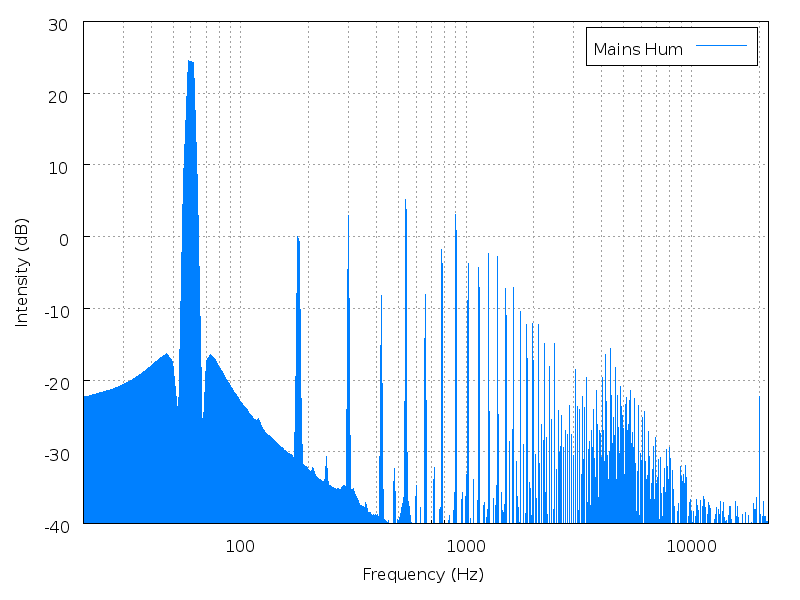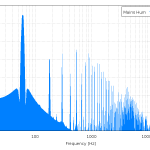Language
Tech Tips: Using EQ To Remove 60-Cycle Mains Hum
If you haven't already experienced this type of noise before, you have more than likely heard about it. The dreaded 60-cycle hum. While it is particularly unpleasant on stage, the last thing you want is for it to creep up during a recording, especially on an otherwise great take. Luckily, there are ways to combat hum with equalization. While many audio editing programs come with plugins that help eliminate this hum, not all of them do. Thankfully, you can tackle this little hiccup with a bit of your own EQ work.
 A spectrum example of 60-cycle/Mains hum.[/caption]
You can also try using a high-pass filter set to either 60Hz or 120Hz to cancel out most of the hum. Obviously, you have to take your instrument into consideration before removing a good chunk of frequencies. For example, using a high-pass filter set at 120Hz for a single-coil bass will remove most of its low-end features, giving it a much weaker bass sound. In that case, setting the high-pass filter at 60Hz wouldn’t be a bad idea. Many already cut bass frequencies below 50Hz so upping that to 60Hz will take care of the noise but shouldn’t hurt the overall tone all that much. For a single-coil electric guitar, using a high-pass filter set at 120Hz will give you similar results – it will take care of the hum while not hurting the overall sound all that much.
Hopefully, the quick tip above will be useful the next time you find yourself tackling the dreaded 60-cycle hum.
A spectrum example of 60-cycle/Mains hum.[/caption]
You can also try using a high-pass filter set to either 60Hz or 120Hz to cancel out most of the hum. Obviously, you have to take your instrument into consideration before removing a good chunk of frequencies. For example, using a high-pass filter set at 120Hz for a single-coil bass will remove most of its low-end features, giving it a much weaker bass sound. In that case, setting the high-pass filter at 60Hz wouldn’t be a bad idea. Many already cut bass frequencies below 50Hz so upping that to 60Hz will take care of the noise but shouldn’t hurt the overall tone all that much. For a single-coil electric guitar, using a high-pass filter set at 120Hz will give you similar results – it will take care of the hum while not hurting the overall sound all that much.
Hopefully, the quick tip above will be useful the next time you find yourself tackling the dreaded 60-cycle hum.
Understanding 60-Cycle Hum And Its Removal
Due to the nature of electricity here in the US (more specifically, the fact that it has a fundamental frequency of 60Hz), players are often faced with the 60-cycle hum, also known as Mains Hum. And while humbuckers do a great job at cancelling out the hum at 60Hz, they are not immune to the other 60Hz intervals (such as 120Hz, 180Hz, etc.) this type of interference can also affect. Naturally, EQ set to any harmonic frequency of 60Hz will do a good job at cancelling out this type of noise, just make sure you use the narrowest Q possible so that your overall sound quality remains intact. [caption id="attachment_5623" align="alignnone" width="800"] A spectrum example of 60-cycle/Mains hum.[/caption]
You can also try using a high-pass filter set to either 60Hz or 120Hz to cancel out most of the hum. Obviously, you have to take your instrument into consideration before removing a good chunk of frequencies. For example, using a high-pass filter set at 120Hz for a single-coil bass will remove most of its low-end features, giving it a much weaker bass sound. In that case, setting the high-pass filter at 60Hz wouldn’t be a bad idea. Many already cut bass frequencies below 50Hz so upping that to 60Hz will take care of the noise but shouldn’t hurt the overall tone all that much. For a single-coil electric guitar, using a high-pass filter set at 120Hz will give you similar results – it will take care of the hum while not hurting the overall sound all that much.
Hopefully, the quick tip above will be useful the next time you find yourself tackling the dreaded 60-cycle hum.
A spectrum example of 60-cycle/Mains hum.[/caption]
You can also try using a high-pass filter set to either 60Hz or 120Hz to cancel out most of the hum. Obviously, you have to take your instrument into consideration before removing a good chunk of frequencies. For example, using a high-pass filter set at 120Hz for a single-coil bass will remove most of its low-end features, giving it a much weaker bass sound. In that case, setting the high-pass filter at 60Hz wouldn’t be a bad idea. Many already cut bass frequencies below 50Hz so upping that to 60Hz will take care of the noise but shouldn’t hurt the overall tone all that much. For a single-coil electric guitar, using a high-pass filter set at 120Hz will give you similar results – it will take care of the hum while not hurting the overall sound all that much.
Hopefully, the quick tip above will be useful the next time you find yourself tackling the dreaded 60-cycle hum.

